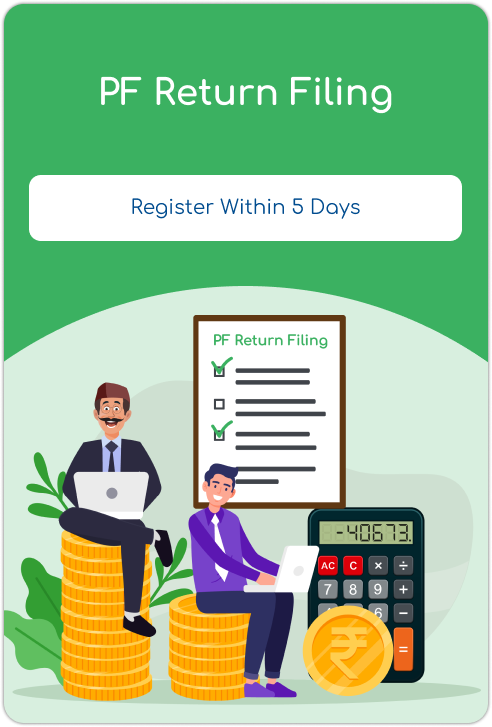
PF Return Filing
132 customers
What will you get?
- Monthly EPF
Contribution Compliance - Exit process
- Approval Request’s
What do we Require?
INR 14225 Taxes As Applicable




Introduction
Introducing our PF Return Filing Solution, a comprehensive tool designed to simplify and streamline the process of filing Provident Fund (PF) returns for your organization. Our product combines advanced features with user-friendly interfaces to provide an efficient and hassle-free experience in meeting your PF compliance obligations. With ProMunim’s PF Return Filing Solution, you can effortlessly manage all aspects of PF return filing, from data collection to submission and compliance verification. Our system automates the tedious tasks involved in PF return preparation, saving you time and effort while ensuring accuracy and compliance with regulatory requirements.
Employee Provident Fund Compliance:
PF return filing is a mandatory process for employers registered under the Provident Fund scheme, involving the submission of detailed reports to the Employees' Provident Fund Organization (EPFO). This essential task must be performed monthly, with a strict deadline set for the 25th day of each month. Employers are tasked with submitting various crucial data points for return filing, including the total contributions made by both the employer and the employee, comprehensive details of covered employees under the scheme, along with their PF account numbers, and other pertinent information. Entities subject to filing PF returns are those falling under the purview of the Employees’ Provident Funds and Miscellaneous Provisions Act, 1952. This includes establishments with 20 or more employees, as well as those with fewer than 20 employees who have voluntarily registered under the Act. Compliance with these regulations is crucial to ensure adherence to statutory requirements and avoid penalties or legal repercussions.
Advantages of Filing Provident Fund (PF) returns:
- Compliance with Legal Requirements:Filing PF returns are a legal obligation for employers under the Provident Fund scheme. Adherence to this requirement ensures avoidance of penalties and fines for non-compliance with regulatory mandates.
- Employee Security:PF contributions form a crucial component of an employee's social security. Consistent filing of PF returns guarantees that these contributions are accurately recorded, safeguarding the financial security of employees during their retirement years.
- Tax Advantages:PF contributions are eligible for tax deductions under Section 80C of the Income Tax Act, 1961. Regular filing of PF returns facilitates employers in claiming these tax benefits, contributing to overall financial efficiency for both employers and employees.
- Organized Record-Keeping:Regular filing of PF returns enables employers to maintain systematic records of employee PF contributions. This organized approach simplifies the tracking and managing of employee benefits, fostering efficient administration and enhancing transparency in financial transactions.
- Employee Welfare:8PF contributions provide employees with a sense of financial stability and long-term savings. By ensuring timely filing of PF returns, employers contribute to the welfare and well-being of their workforce, fostering a positive work environment and employee satisfaction.
- Credibility and Reputation:Compliance with PF regulations enhances the credibility and reputation of an organization. It demonstrates a commitment to ethical business practices and employee welfare, strengthening trust and loyalty among stakeholders, including employees, investors, and customers.
- Facilitates Employee Recruitment and Retention:Offering PF benefits and ensuring timely filing of PF returns can attract top talent to the organization and improve employee retention rates. PF contributions are perceived as valuable employee benefits, enhancing the employer brand and competitiveness in the job market.
- Form 5:This form is used for the registration of new employees under the EPF scheme and for updating employee details such as name, address, and date of birth.
- Form 9:Form 9 is used for making declarations by employees for membership of the Provident Fund.
- Form 10:Employers use this form for the declaration and nomination of beneficiaries by employees.
- Form 11:This form is utilized for providing details of new employees to the EPFO, including their PF account numbers and other relevant information.
- Form 12A:Employers use this form for the registration of establishments under the EPF scheme.
- Form 3A:Monthly contribution details of employees are reported using Form 3A. It includes information on the amount of PF contributions deducted from employees' wages.
- Form 6A:Form 6A is an annual contribution statement that provides details about the annual PF contributions made by each employee.
- Form 2:Form 2 is filed as a declaration and nomination under the EPF scheme. It includes details of nominees who would receive the EPF balance in the event of the account holder's death.
- Form 2 (Part A and Part B):Part A of Form 2 deals with nominating recipients of the EPF balance, while Part B includes details of members eligible to receive children/widow pension.
- Form 10D:This form is used for claiming the benefits under the Employees' Pension Scheme (EPS) by the employees.
- Form 13:Employees use this form for transferring their PF balance from one establishment to another when changing jobs.
Process for filing PF monthly returns using the service provided by Promunim:
- Data Collection:Promunim assists in collecting all necessary data related to PF contributions for the month. This includes employee wages, PF contribution amounts (both employer and employee contributions), and any other relevant information required for filing.
- Data Verification:our dedicated officers verify the collected data to ensure accuracy and completeness. Through automated checks and validation processes, any discrepancies or errors are identified and corrected before proceeding.
- PF Return Preparation:Using its specialized software or platform, Promunim prepares the PF return in the prescribed format. The collected data is entered into the designated fields of the PF return form or software, ensuring compliance with EPFO guidelines.
- Challan Generation:Promunim generates the PF challan (Electronic Challan cum Return or ECR) for the month based on the contribution amounts calculated. The challan includes details of the total PF contributions to be deposited with the EPFO.
- Payment Facilitation:Promunim facilitates the payment process by providing guidance on depositing the total PF contribution amount mentioned in the challan to the designated bank account of the EPFO. It may offer integration with banking platforms for seamless payment transactions.
- Submission Assistance:Once the payment is made, Promunim assists in submitting the PF return along with the generated challan to the EPFO. It provides guidance on the specified submission process, which may involve uploading the return online or submitting it physically to the EPFO office.
- Acknowledgment Retrieval:Promunim helps in obtaining an acknowledgment or receipt from the EPFO after submitting the PF return and challan. This serves as proof of submission and payment and is retained for record- keeping purposes.
- Status Tracking:Promunim enables employers to track the status of the submitted PF return and payment. Real- time updates and notifications ensure that any discrepancies or issues with the submission are promptly addressed.
- Nil Return Filing (if applicable):If there are no PF contributions for the month, Promunim facilitates the filing of a nil return, indicating zero contributions. This ensures compliance with PF filing requirements even when no contributions are made.
Consequences:
- Penalties:The Employees' Provident Fund Organization (EPFO) has the authority to levy penalties on employers for non-compliance. Penalties may be imposed for delayed filings, incorrect reporting, or failure to adhere to statutory requirements. The EPFO can impose penalties of up to Rs. 5,000 per day for delayed filings, depending on the duration of the delay.
- Legal Action:Non-compliance with PF filing regulations may result in legal action against the employer. The EPFO has the power to initiate legal proceedings against employers who fail to fulfil their PF filing obligations. Legal action may include prosecution in court, which can lead to fines and other legal consequences.
- Loss of Reputation:Non-compliance with PF filing requirements can damage the reputation of the employer. Failure to fulfil statutory obligations reflects poorly on the organization and may lead to negative publicity. Loss of reputation can have long-term consequences, including difficulties in attracting talent, securing contracts, and maintaining customer trust.
- Employee Dissatisfaction:Non-compliance with PF regulations can lead to dissatisfaction among employees. Employees rely on PF contributions for their financial security and retirement planning. Failure to comply with PF filing requirements may result in delayed or incorrect contributions, causing frustration and dissatisfaction among employees.
- Loss of Employee Benefits:Non-compliance with PF regulations may result in the loss of employee benefits. Employees may be deprived of their entitlements, including provident fund contributions, pension benefits, and insurance coverage. Failure to fulfil PF obligations can jeopardize employee welfare and financial security.
- Financial Loss:Non-compliance with PF filing requirements can result in financial losses for the organization. Penalties imposed by the EPFO, legal expenses, and reputational damage can all contribute to financial losses for the employer. Additionally, delayed or incorrect PF contributions may lead to liabilities and financial penalties.
- Difficulty in Business Operations:Non-compliance with PF regulations can disrupt business operations and create administrative challenges for the employer. Legal proceedings, penalties, and reputational damage can divert resources away from core business activities and hinder growth and productivity.

